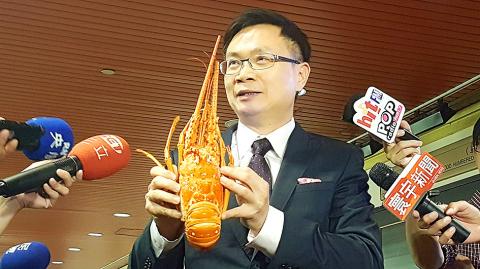The Taiwan External Trade Development Council (TAITRA, 外貿協會) yesterday said it has bolstered diplomatic ties with Central American allies after a delegation inked deals for US$11.06 million in seafood imports.
Early this month, the nonprofit government-sponsored trade promotion institution led a delegation of 10 local seafood importers, including Mayfull Foods Corp (美福食集), on visits to seafood suppliers in Guatemala, Honduras and Nicaragua.
The council said that it secured long-term procurement deals during the trip for the region’s specialty Pacific white shrimp and Caribbean spiny lobster.

Photo: CNA
Taiwan has an immense appetite for seafood, with annual imports last year reaching US$400 million, while exports totaled US$100 million, it said.
“Compared with investments, purchasing imports is a more direct way to help boost the economic growth of Taiwan’s diplomatic allies,” TAITRA chairman James Huang (黃志芳) said at a news conference in Taipei yesterday.
Over the next year, Taiwanese importers are to purchase another US$48 million of seafood, besting the total of a procurement delegation last year, which secured US$16 million in beef import contracts, he said.
Asked if the purchases were aimed at countering China’s efforts to poach Taiwan’s diplomatic allies in the region, Huang said that diplomacy and economic cooperation go hand in hand.
The council strives to achieve mutual economic growth with all of the nation’s allies, he said.
Taiwan has lost three diplomatic allies in the region since last year: Panama in June last year, the Dominican Republic on April 30 and El Salvador last month.
Taiwan has over the past decade enjoyed the benefits of free-trade agreements with Guatemala, Honduras and Nicaragua, said Y.C. Tsai (蔡允中), a negotiator from the Office of Trade Negotiations, the Cabinet-level agency responsible for implementing such policy.
The waiving of tariffs — typically ranging between 15 percent and 20 percent — would lead to savings for local consumers, he said.
There has been a 10-fold shortfall in local seafood supply that must be filled by imports, TAITRA International Marketing Advisory Center deputy executive director Krist Yen (顏貽彬) said.
Shellfish such as shrimp and lobster are Taiwan’s smallest seafood export and import category, while fish is the biggest item, Yen said.
Taiwan last year imported US$1.06 billion of seafood from Guatemala, Honduras and Nicaragua, up 9.67 percent from 2016, TAITRA data showed.
Nicaragua is Taiwan’s biggest source of frozen shrimp, supplying 19 percent of last year’s US$231.8 million of shrimp imports, followed by Honduras at 17 percent, while Guatemala ranks 12th at 0.7 percent, the data showed.

GROWING OWINGS: While Luxembourg and China swapped the top three spots, the US continued to be the largest exposure for Taiwan for the 41st consecutive quarter The US remained the largest debtor nation to Taiwan’s banking sector for the 41st consecutive quarter at the end of September, after local banks’ exposure to the US market rose more than 2 percent from three months earlier, the central bank said. Exposure to the US increased to US$198.896 billion, up US$4.026 billion, or 2.07 percent, from US$194.87 billion in the previous quarter, data released by the central bank showed on Friday. Of the increase, about US$1.4 billion came from banks’ investments in securitized products and interbank loans in the US, while another US$2.6 billion stemmed from trust assets, including mutual funds,

AI TALENT: No financial details were released about the deal, in which top Groq executives, including its CEO, would join Nvidia to help advance the technology Nvidia Corp has agreed to a licensing deal with artificial intelligence (AI) start-up Groq, furthering its investments in companies connected to the AI boom and gaining the right to add a new type of technology to its products. The world’s largest publicly traded company has paid for the right to use Groq’s technology and is to integrate its chip design into future products. Some of the start-up’s executives are leaving to join Nvidia to help with that effort, the companies said. Groq would continue as an independent company with a new chief executive, it said on Wednesday in a post on its Web

Micron Memory Taiwan Co (台灣美光), a subsidiary of US memorychip maker Micron Technology Inc, has been granted a NT$4.7 billion (US$149.5 million) subsidy under the Ministry of Economic Affairs A+ Corporate Innovation and R&D Enhancement program, the ministry said yesterday. The US memorychip maker’s program aims to back the development of high-performance and high-bandwidth memory chips with a total budget of NT$11.75 billion, the ministry said. Aside from the government funding, Micron is to inject the remaining investment of NT$7.06 billion as the company applied to participate the government’s Global Innovation Partnership Program to deepen technology cooperation, a ministry official told the

JOINT EFFORTS: MediaTek would partner with Denso to develop custom chips to support the car-part specialist company’s driver-assist systems in an expanding market MediaTek Inc (聯發科), the world’s largest mobile phone chip designer, yesterday said it is working closely with Japan’s Denso Corp to build a custom automotive system-on-chip (SoC) solution tailored for advanced driver-assistance systems and cockpit systems, adding another customer to its new application-specific IC (ASIC) business. This effort merges Denso’s automotive-grade safety expertise and deep vehicle integration with MediaTek’s technologies cultivated through the development of Media- Tek’s Dimensity AX, leveraging efficient, high-performance SoCs and artificial intelligence (AI) capabilities to offer a scalable, production-ready platform for next-generation driver assistance, the company said in a statement yesterday. “Through this collaboration, we are bringing two